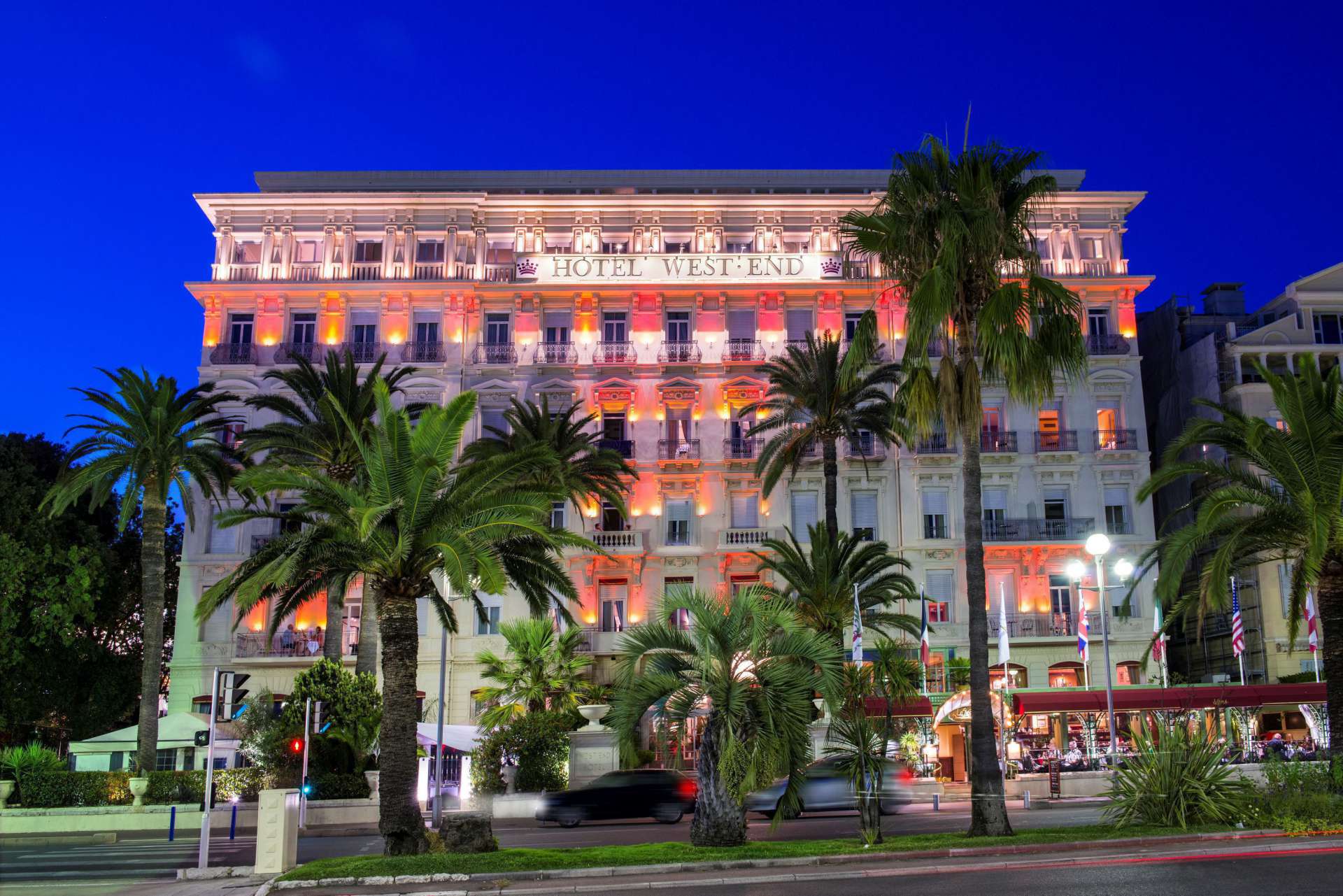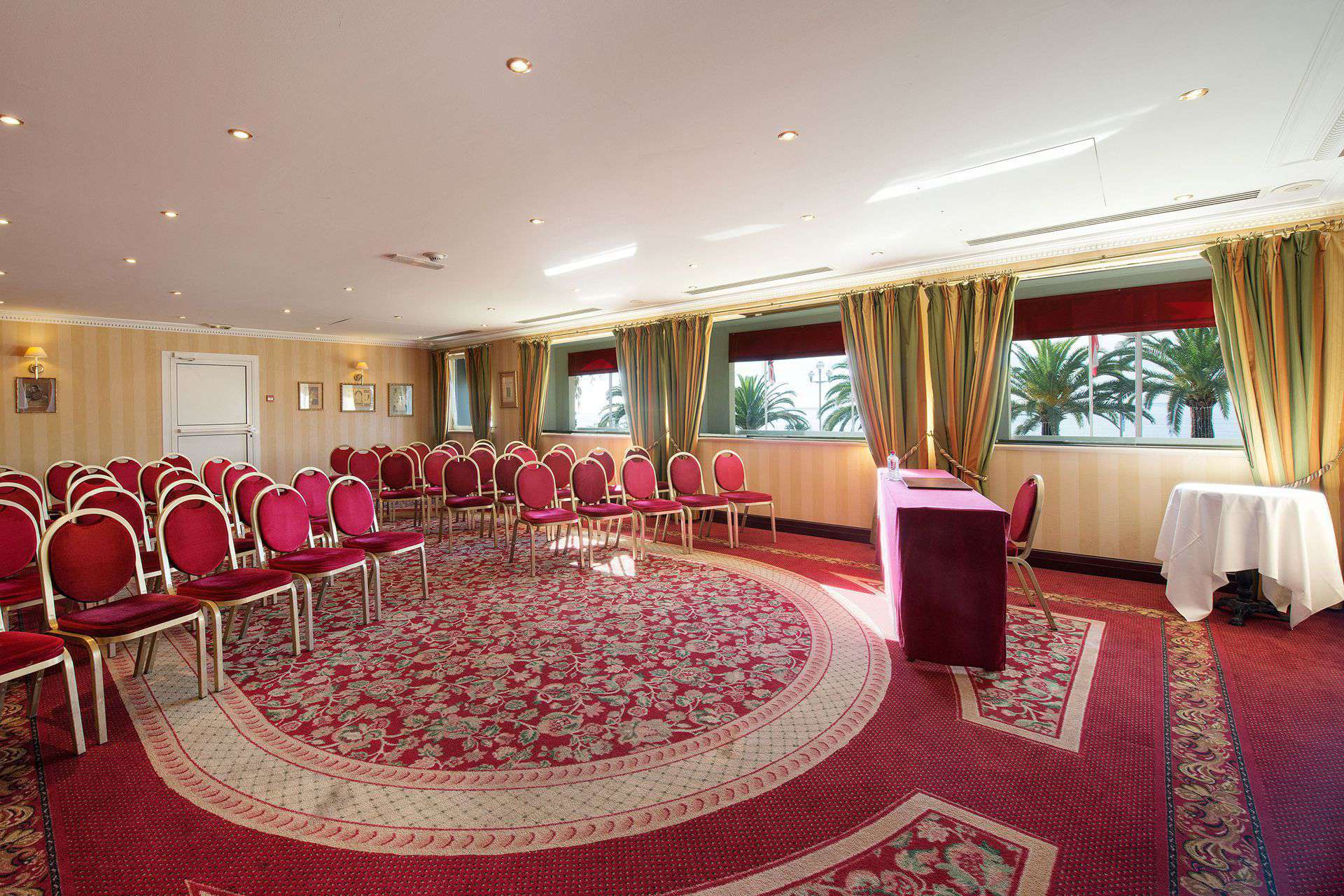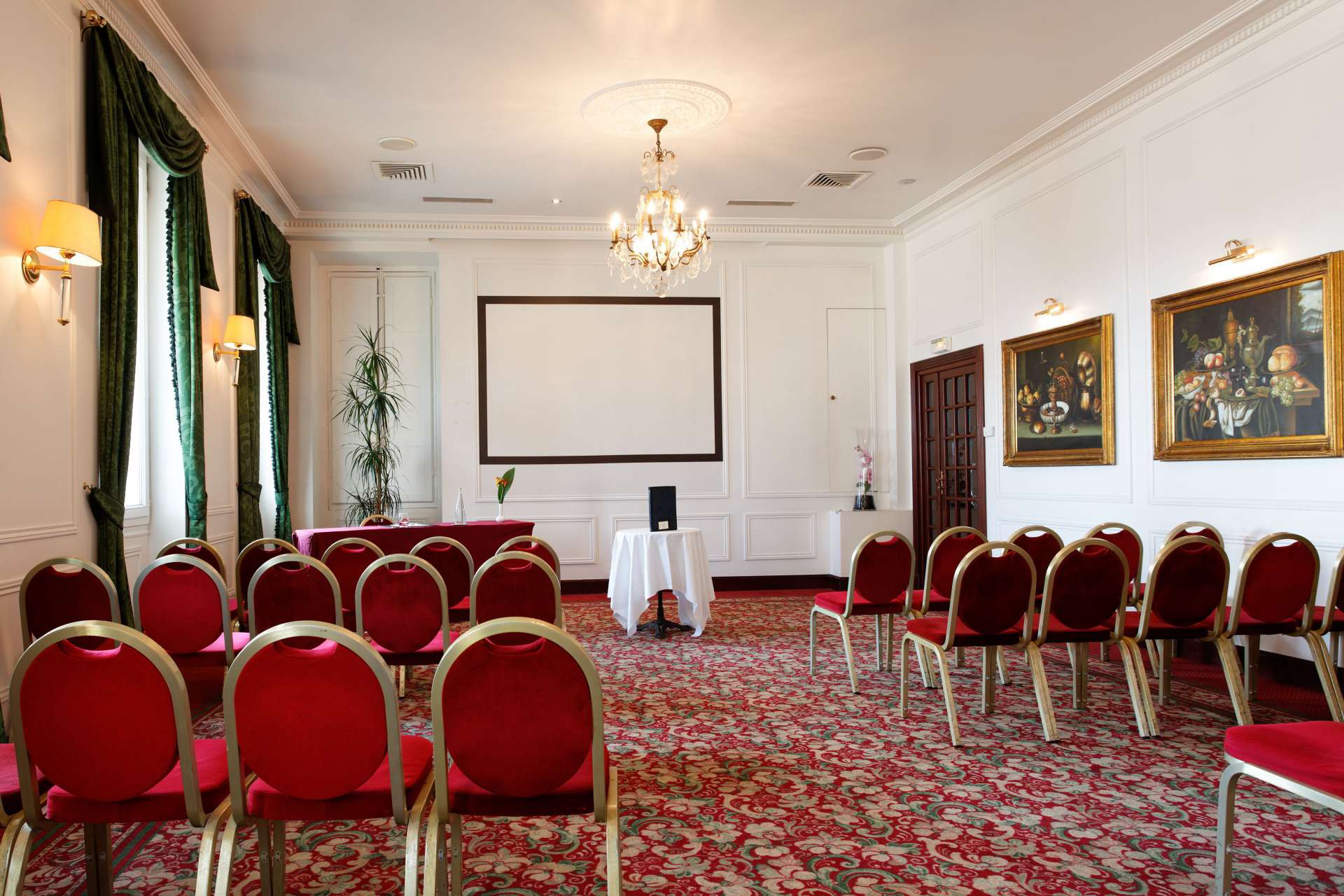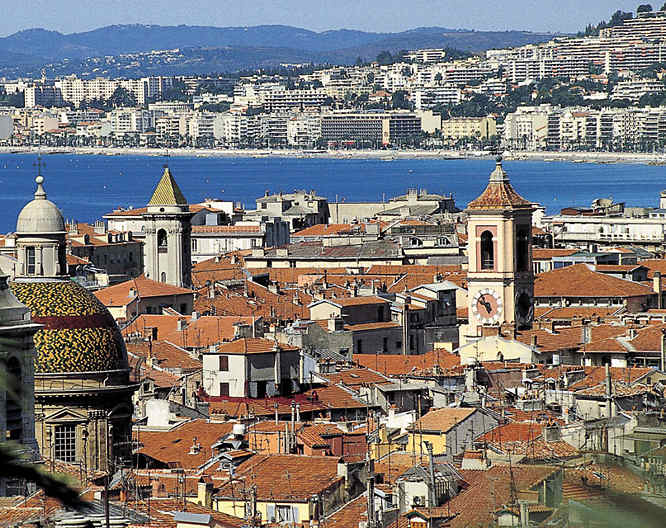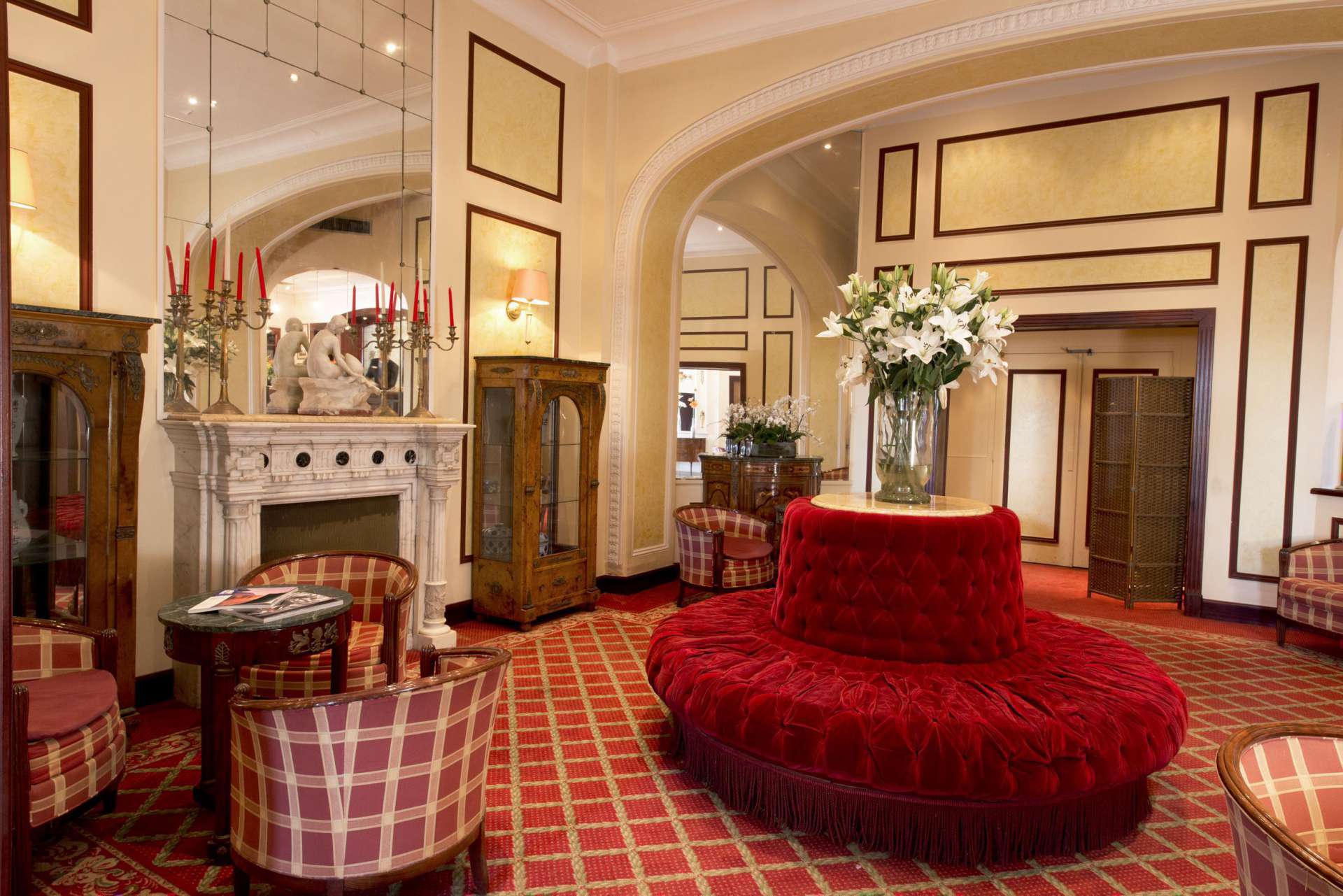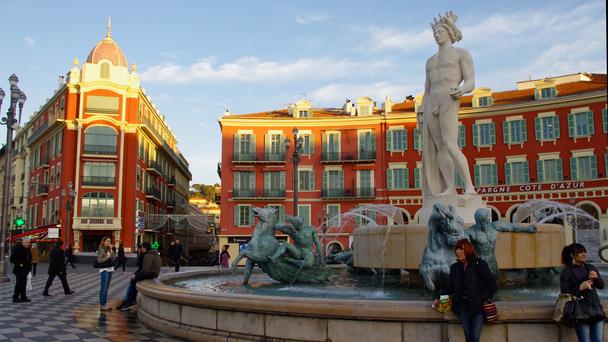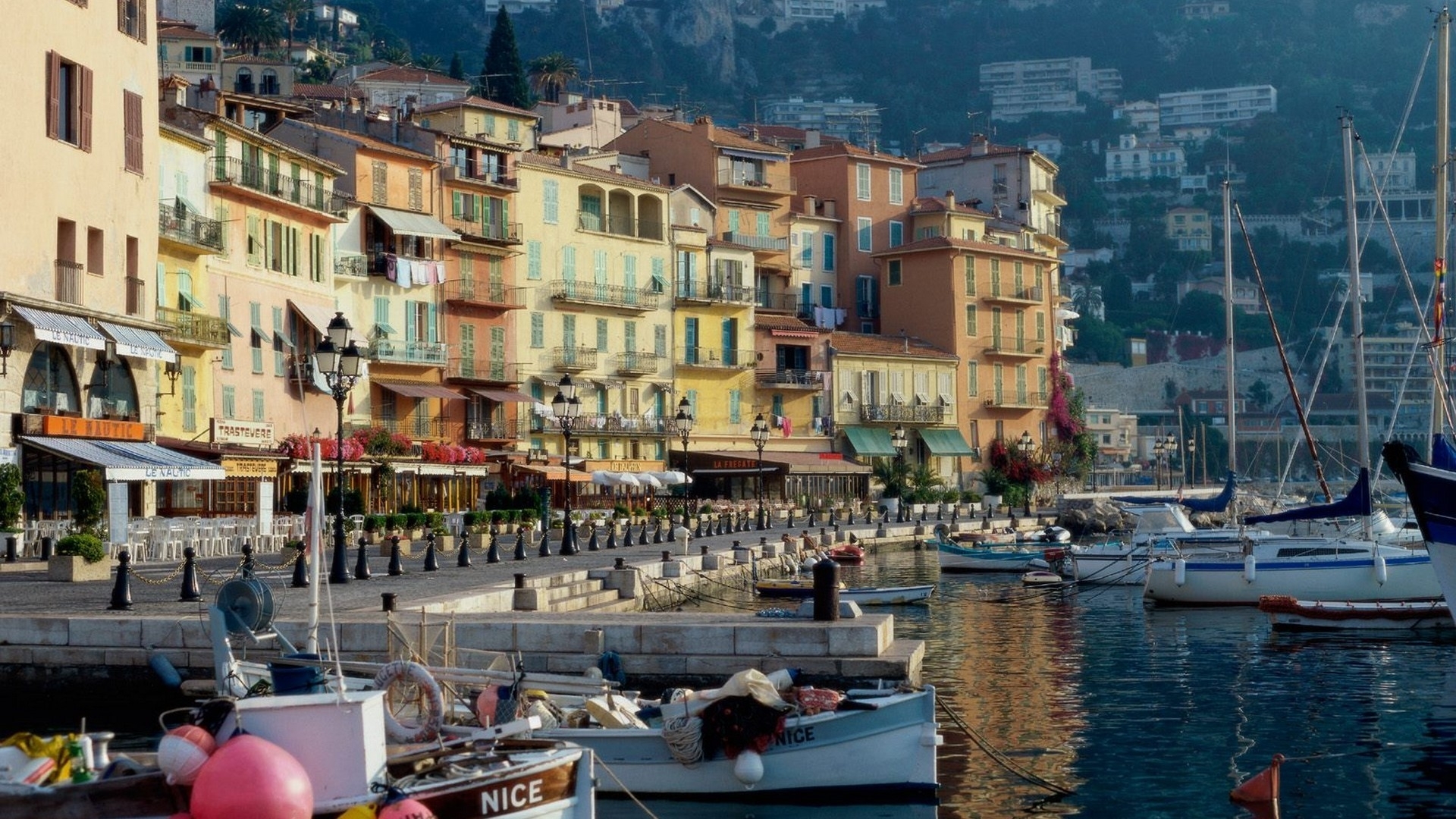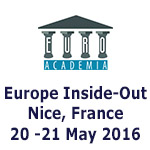West End Hotel
Conference Room: The Auditorium
31 Promenade des Anglais
06000 Nice, FranceConference Agenda
- May 20, 2016
- 09:00 - 09:30Participants Registration (Registration Desk – The Auditorium)
- 09:30 - 10:30Welcome and Opening Remarks
- 10:30 - 11:00Coffee Break and Snacks
- 11:00 - 13:00Panel 1: Art, History and Identity Making Practices in Europe: Visual Readings of the Past Signifiers
- 13:00 - 14:30Lunch – West End Hotel
- 14:30 - 16:30Panel 2: Assessing European Multiculturalism and the Self/Other Nexuses: Cosmopolitan, Deconstructionist and Post-Colonial Readings of Intellectual Narratives and their Genealogies
- 16:30 - 17:00Coffee Break and Snacks
- 17:00 - 19:00Panel 3: European Values and the Process of Europeanization: Institutional Change, Discourses and Perceptions from Enlargement to Brexit
- 19:00 - 19:45Welcome Drink Out in Nice
- 19:45 - 21:00Optional Social Dinner Out in Nice
- May 21, 2016
- 09:30 - 11:30Panel 4: Performing Identities through Artistic Narratives: Well-Being, Self-Expression and Symbols of Identification
- 11:30 - 12:00Coffee Break and Snacks
- 12:00 - 13:00Panel 5:European History and Identities: Mnemonic Representations in Artistic Heritage
- 13:00 - 14:30Lunch – West End Hotel
- 14:30 - 15:30Panel 5: European History and Identities: Mnemonic Representations in Artistic Heritage
- 15:30 - 16:00Coffee Break and Snacks
- 16:00 - 18:00Panel 6: European Economies and the Impact of Europeanization: Domestic and Regional Dimensions
- 18:00 - 19:00Concluding Remarks and Discussions
- 19:00 - 21:00Optional Social Dinner Out in Nice
- May 20, 2016
Europe Inside-Out: Europe and Europeanness Exposed to Plural Observers (Sixth Edition)
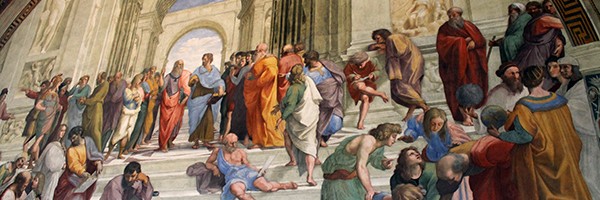
- Conference Description
- Participant’s Profile
- Registration and Fee
- Social Activities and Publication
- Important Dates
- Venue and Directions
- Conference Program
- Panel 1
- Panel 2
- Panel 3
- Panel 4
- Panel 5
- Panel 6
The 6th Euroacademia International Conference
Europe Inside-Out: Europe and Europeanness Exposed to Plural Observers
20 – 21 May 2016
Nice, Côte d’Azur, France
Conference Description:
Europe became in the 20th century an elaborated yet contested notion as a particular field of European studies emerged and extensive and diverse research was directed recently towards an intensified search for what Europe is about. The creation of the European Union made things even more specialized and increased the stake of methodological rigor as more and more Europeans are affected by the decisions taken in Brussels. The number, diversity and quality of research projects focused on European issues is unprecedented, yet, as it is usually the case with specialization it gradually led to discursive communities that rarely meet and debate their approaches in open floors together with peers from other continents, academic traditions and cultures. It is the aim of this conference to build a bridge among specialists from different regions, academic traditions and cultures that share a common interest in studying and addressing Europe as a reflexive concern.
The 6th Global Conference ‘Europe Inside-Out: Europe and Europeanness Exposed to Plural Observers’ aims exactly to refresh a broader approach and understanding of Europe by enlarging the platform of regular conferences and workshops for a wider arena of participants and disciplinary backgrounds in order to put on stage a worldwide monadology for such concerns. It is an intellectual event that addresses constructive thinking. The conference aims to enable critical alternatives to the disciplinary orthodoxy by creating a framework for interaction and dissemination of diversity that has to become once more a European trademark. The conference also aims to become a constructive confrontational space for alternative methodologies, provocative puzzles, inter, multi and trans-disciplinary understandings for wider and also for thinner specialized issues of concern on or about Europe of today and tomorrow. In a way, the conference stands to become a moment of return to the European specificity of critical self-understanding through dialogue and debate with all the discursive or narrative traditions that directly or indirectly constitute Europe in its plural facets.
What is Europe and its place in the world? Is there something particular that sediments in time a ‘European way’? How does Europe see itself and how do others see it? Is Europe inclusive or club-based exclusive? Is Europe becoming a normative power or just envisages itself as one? Is the European multiculturalism a fact or an ideal? Is the European Union a reflection of Europe or an appropriation of it? These are just few questions out of an enormous space for inquiry that are to be addressed and confronted within the topic of the conference.
The 6th Euroacademia Conference ‘Europe Inside-Out: Europe and Europeanness Exposed to Plural Observers’ became a regular event to take place in every year in a different European location. After five successful editions – in Vienna, Paris, Prague, Athens and a fifth in Barcelona – Euroacademia moves the stage of reflection, sharing, dialogue, debate and research dissemination on Europe to Nice on the beautiful French Riviera. Join us!
Participant’s Profile
The conference is addressed to academics, researchers and professionals with a particular interest in Europe, Europe related and European Union topics from all parts of the world. As the nature of the conference is intended to be multidisciplinary in nature, different academic and intellectual backgrounds are equally welcomed. Cultural approaches, political studies, critical studies, out of mainstream approaches and artistic/literary contributions to the better understanding of Europe in its past present and future dimensions are all equally welcomed. Euroacademia favors inclusive alternative and innovative thinking proposals and non-mainstream methodologies.
Post-graduate students, doctoral candidates and young researchers are welcomed to submit an abstract. Representatives of INGOs, NGOs, Think Tanks and activists willing to present their work with impact on or influenced by specific understandings of Europe and/or the European Union are welcomed as well to submit the abstract of their contribution.
Abstracts will be reviewed and the participants are selected based on the proven quality of the abstract. The submitted paper for the conference proceedings is expected to be in accordance with the lines provided in the submitted abstract.
Registration and Fee
Registration is now closed
The Participation Fee Includes:
- the registration fee
- official invitation
- full access to the conference program
- participant’s package with all the materials for the conference
- eligibility for inclusion in the conference proceedings published volume
- a copy of the electronic volume
- access to Euroacademia discussion group and newsletters
- coffee brakes and refreshing drinks for all the duration of the conference
- a 3 course lunch on 20th of May 2016 at a 4 stars West-End Restaurant
- welcome drink out in Nice on 20th of May 2016
- a 3 course lunch on 21st of May 2016 at a 4 stars West-End Restaurant
- certificate of attendance
- access to the optional social program
Unfortunately, Euroacademia has no available funds for covering transport and accommodation to/in Nice. Participants are responsible for securing funding to cover transportation and accommodation costs during the whole period of the conference. Official invitation letters can be sent by Euroacademia to the financing institution to confirm the selection and participation in the conference upon request.
Social Activities and Publication
A specific spot in the conference program will be dedicated to social networking and therefore all the participants interested in setting or developing further cooperation agendas and prospects with other participants will have time to present and/or promote their project and express calls for cooperation.
A specific setting (Social Corner) for promotional materials connected with the topic of the conference will be reserved for the use of the participants. Books authored or edited by the participants can be exhibited and promoted during the whole period of the conference and can also be presented within the conference package based on prior arrangements.
Photos and videos will be taken during the conference and the organizers will consider through the participation of selected presenters or members of the audience that the agreement for being photographed or filmed during the event was granted through registration to the event. Please notify the organizers in written form prior to the the event if you are a confirmed participant and would prefer otherwise.
An optional dinner and a social event will be organized for the second evening of the conference in a typical French cuisine restaurant as optional program for the willing participants. The social dinner will be held based on participant’s confirmation and it costs around 25 Euro to be covered by participants on spot.
Publication:
Selected papers will be published in an electronic volume with ISBN after the confirmation of the authors and a double peer-review process based on an agreed publication schedule. All the papers selected for publication should be original and must have not been priory published elsewhere. All participants to the conference will receive a copy of the volume.
Specific selected papers will be also published in CEJISS (Central European Journal of International & Security Studies)
About CEJISS
Formally launched in January 2007, CEJISS is designed as a double-destination scholarly bridge. The first bridge was constructed with Central Europe (Czech Republic, Hungary, Poland and Slovakia) in mind, focusing on increasing the audience for Central European scholars. In this regard, CEJISS is making a substantial impact as each issue attracts attention in some 45,000 people in nearly 160 countries. However, CEJISS is not Central European centric and invites scholars from around the world to contribute. This has meant that just as Central European scholars now have an easier time gaining a footing outside of the region, so international scholars also have an easier time getting in and making an impact here. With a mere two decades separating our times from the ‘darker’ Cold War years, CEJISS aims to contribute English language perspectives to the peoples of Central Europe and give the latter the amplification their research deserves.
| Important Dates | |
|---|---|
| 15th of March 2016 | Deadline for Submitting Panel Proposals |
| 22nd of April 2016 | Extended Deadline for Submitting Paper Proposals |
| 23rd of April 2016 | Latest notification of acceptance |
| 25th of April 2016 | Sending the Registration Form |
| 28th of April 2016 | Payment of the conference fee |
| 5th of May 2016 | Sending the draft paper to be uploaded on the conference website |
| 10th of May 2016 | Publication of the conference program and uploading the draft papers on the website |
| 20th of May 2016 | The conference commences at 9.00 am |
Venue and Directions
The conference will take place in Nice, on the beautiful French Riviera, within the conference premises of the exclusive XIXth century 4 Stars West End Hotel, located right in the heart of Nice on the famous Promenade des Anglais. Built in 1842, the West End Hotel is a jewel of the Belle Epoque immersed in the amazing atmosphere of the Côte d’Azur and facing the breathtaking view of the Mediterranean sea.
West End Hotel
31 Promenade des Anglais – 06000 Nice – France
tel: +33 4 92 14 44 05
fax: +33 4 93 88 85 07
[email protected]
Nice is an amazing city on the French shores of the Mediterranean Sea in the heart of what is known as the Côte d’Azur. Nice is famous for its beauty being also called Nice la Belle. A calm walk unfolds the beauty of the old town and of the port as well as panoramic views of the sea and its beaches. The second largest city in the region Provence-Alpes-Côte d’Azur, Nice became famous in the late 18th century and became the second French destination for travelers after Paris. Chosen initially mainly by the British aristocratic families coming to enjoy the mild Mediterranean weather in the winter, Nice became gradually an all seasons destination for millions of travelers. This was also due to famous depictions in paintings by renown artists that spent time in Nice charmed by its beauty: Marc Chagall, Henri Matisse or Niki de Saint Phalle – to name just a few.
HERE
Conference participants are fully responsible for arranging the accommodation and travel to Nice.
Conference Program
The Conference Agenda is available in the right sidebar.
The conference program with abstracts and available draft papers is accessible below by clicking on the panel number tabs and individual presentations.
Art, History and Identity Making Practices in Europe: Visual Readings of the Past Signifiers
- The Collective Identity of Philip the Bold’s Mourners and the Ideology of the Common GoodThis paper will argue that in the early Burgundian state to mourn the death of a duke was a means to represent and enact an idealised, loving relation between lord and subject. By being represented as mourned by a diversity of classes on his tomb, Philip was represented as a lord beloved by all for ruling for the ‘common good.’Andrew Murray, Deutsches Forum für Kunstgeschichte, Paris
- Great Dane Meets Dalmatian. Ejnar Dyggve and the Creating of the Cultural Crossroads in EuropeThe paper picks a complementary context between Denmark and Croatia as a model for questioning of the European cultural continuity, where the comparative investigation of the life-long collaboration and competition between the two exact contemporaries Ejnar Dyggve and Ljubo Karaman (1886-1971) serve as a special case.Slavko Kacunko, Department of Arts and Cultural Studies (IKK), University of Copenhagen, Denmark
- The Threads of a Life Well Lived: Beyond the PortraitThis research interrogates textile as the principle decorative medium in how fabrics were woven, dyed, printed and stitched to give varying textures, and the threads woven to create a life lived through performance and the mediums of language, fashion and culture to create specific cultural memory.Alison Oddey, University of Derby, United Kingdom
- Europe: Décadence et élan. Images of the Eternal Return of AbendlandFollowing a series of images, from the decadent Venetian paintings of the Tiepolos to the artificial suns of Laurent Grasso and other contemporary artists, we seek to unveil the intertwined forces of décadence and élan – which could be translated as “impulse”, “momentum” or “vigorous spirit” – that configure the becoming of Europe.Marta López-Marcos, Universidad de Sevilla, Spain / TU Delft, NetherlandsCarlos Tapia Martín, Universidad de Sevilla, Spain
Assessing European Multiculturalism and the Self/Other Nexuses: Cosmopolitan, Deconstructionist and Post-Colonial Readings of Intellectual Narratives and their Genealogies
- Diversity by Adversity: Europe and the Multicultural MandateThis paper will explore the factors that impact multiculturalism in Europe today. The perceptions versus the realities will be foregrounded, and the contextual lens will be expanded to include geopolitical upheavals that render diversification in Europe less an option and more of an inevitability. Additionally, the edges of this analysis will be elucidated with some of my relevant travel experiences as an American in Europe.Ronald Milland, Independent Scholar, Brooklyn, New York, USA
- Beyond Nationalism: A ‘Union in Diversity’ of European National Identities in Twentieth Century Narratives of TravelI will demonstrate how it is through valuable cultural productions such as these narratives of travel that Europeans are exposed to an alternative and more inclusive mode for identity construction, which triumphantly forwards what Ulrich Beck describes as “a Europe that helps diversity to flourish”Rhian Collings, “Crossways in Cultural Narratives” - Università degli Studi di Bergamo (IT), University of Guelph(CA), Universidade Nova de Lisboa (PT)
- Beyond Language: A Derridean Analysis of Linguistic DispossessionThe task now is to understand the mechanisms of linguistic dispossession, and analyze how language is used to manufacture the ethical erasure of the Other. Ultimately, the hope is to provide a new platform from which to allow for critical analyses of the contemporary Refugee, and reclaim the ethical within her.Sabeen Ahmed, Vanderbilt University, Nashville, USA
- Orientalism’s Genocidal LogicElucidating the logic of this racism and tracing its development beyond Renan’s oeuvre, including not only the massacre at Sabra and Shatila but other archival sources as well, will constitute the bulk of my presentation. As time permits, I will be happy to discuss the significance of what Mbembe calls ’militant bulldozing’ in his article ’Necropolitics’, Said’s claim that orientalism is a fundamentally philological program, the meaning of the slur ’sand nigger’, and why it is important to distinguish this form of anti-Arab racism from other types of racism.John Elias Nale, University of Alabama-Huntsville, USA
European Values and the Process of Europeanization: Institutional Change, Discourse and Perceptions from Enlargement to Brexit
- An Analytical Approach on EuropeanizationThe present paper aims to propose a comprehensive research design for the better ontological and epistemological understanding of Europeanization. It elaborates a working definition on the notion by clearly separating Europeanization and European Integration. Though this definition is a narrow one compare to the mainstream explanations of Europeanization, yet the paper argues, as a starting point, that the current descriptions of the notion are too wide and by this they overly blur the intensional and extensional components of the concept.Zoltan Grunhut, Centre for Economics and Regional Studies, Hungarian Academy of Science, Hungary
- An Increasingly Awkward Partner? Images of the EU in the Brexit Debateusing Foreign Policy Discourse Analysis, a form of discourse analysis based on Foucault’s conception of discourse, the paper aims to place the current discourse on Brexit in the broader context of the dominant British discourse on state and nation and Europe. To this end, the paper analyses the discourse of both campaigns by focusing on speeches and articles of cross-party prominent politicians from both groups as well as both campaigns’ manifestos.Catherine MacMillan, Yeditepe University, Istanbul, Turkey
- How European We Are: Georgians? Identity Concerns in the Process of EuropeanisationThe paper discusses Georgians' popular discourses on Europeanisation focusing on their main identity concerns. The first concern relates to Georgians' Europeanness by making a sharp division between the 'European' and 'Third World' identities and trying to find out how European Georgians are. This question has become especially crucial after Georgia's signing of the Association Agreement with the EU, which has encouraged the population to search for the closer ties with the European identity.Lia Tsuladze, Tbilisi State University and Research Fellow, St. Antony's College, University of Oxford
- Enlargement Conditionality in the Sphere of Anti-Corruption: Has the EU Learned from its Previous Mistakes?Rather than following the narrative that the EU plays a key role, this paper argues (a) that EU anti-corruption conditionality has been mainly limited to the adoption of anti-corruption laws and (b) that its success depends on specific domestic circumstances in candidates. The paper employs documentary analysis and semi-structured elite interviews with national and EU experts on corruption and enlargement.Liljana Cvetanoska, Centre for European Studies, Department of Politics, University of Sussex, UK
Performing Identities through Artistic Narratives: Well-Being, Self-Expression and Symbols of Identification
- Dimensions of European Wellness: Contemporary Design and the Visions of Life and the Self: `The New Apothecary´s Cabinet No.2´ Mind-Body-SpiritThis project forms part of a sustained programme of research `The Cultural Value of the Arts for Health & Well-Being´, which employs methods and processes across Art and Science, designed to test and transform perceptions of what it is to live well and be happy, raising public awareness and engagement, to stimulate sustainable, social and cultural debate and significant public dialogue across Europe.Alison Oddey, University of Derby, United KingdomChristine White, University of Derby, United Kingdom
- Self-Representation in the Age of the Internet. Social Media as a New Tool for the Construction of Identity in Contemporary ArtThe idea of the artist was to play with storytelling and social media. So it came that Ulman, between May and August 2014, enacted her own persona and amassed close to 65,000 followers on Instagram. She created a fictional self on Instagram and declared her Instagram identity as a performance entitled “Excellences & Perfections”. In Ulman’s performance, social media is experienced as a new medium in contemporary art and focuses on the self-expression of young girls in the Internet age. In my presentation, I would like to explore how artists make use of social media in their work and how this practices influences the question of self-representation in contemporary art in the internet age.Ismene Wyss, Institute for Art History, Bern University, Switzerland
- Icons of Virgin Mary and the Shaping of Identity in Central EuropeIn this paper, the role and the spread of the devotional image of Mariahilf are demonstrated by an example. An icon of Mariahilf was worshipped in Passau and had an important role already in the Thirty Years' War; it was believed that it ensured the victory over the Ottomans in 1683 in the Battle of Vienna. The pious Emperor Leopold I was its loyal worshipper. He married his third wife under the icon and prayed to it every day during the siege of Vienna. After that battle, Mariahilf images spread throughout Central Europe and can thus be found in parish churches, monastic, succursal and pilgrimage churches as well as private aristocratic chapels and painting collections. Furthermore, Mariahilf was often depicted on the facades of private houses. When certain aristocrats (e.g. Georg Gotfried Count Lamberg, the Provincial Commander of Teutonic Knights) identified themselves with the icon of Mariahilf, this contributed to their career success in the service of the Emperor.Metoda Kemperl, Faculty of Education, University of Ljubljana, Slovenia
- A Gendered National Festival on a Greek Island ShrineThe paper is based on several periods of fieldwork, carried out since 1990 to the present, involving research into the festival dedicated to the Dormition of the Panagia on Tinos, and it aims to explore some of the main elements of this festival taking place on the margins of Europe, within a socio-economic and political framework.Evy Johanne Håland, Independent Researcher
European History and Identities: Mnemonic Representations in Artistic Heritage
- Objects and Concepts of Musical Nationalism in 19th Century GreeceThe present paper will demonstrate the importance of these conflicting dominant ideologies in the construction of Greek-European identity during the last decades of the 19th century, through the illustration of the symbolic function of a Collection of National Songs, notated in Byzantine notation and published in Athens in 1880, while contextualizing it within the cultural and political environment of the turn of the century.Artemis Ignatidou, Brunel University London, UK
- Reading Monuments – Building Memories Depictions of Books in Holocaust MemorialsIn this study I will consider interactions between verbal and visual memory traditions, by examining monuments and art installations that use books and libraries as symbols to commemorate the Holocaust. This will be done by focusing on three concrete monuments: „The Empty Library” by Micha Ullman in Berlin, The „Nameless Library” by Rachel Whiteread in Vienna and „The Hall of Names” by Moshe Safdie in the Yad Vashem museum in Jerusalem. Interestingly, books and archives are increasingly used in monuments in an age in which media innovations have challenged the position of the traditional printed book.Moran Pearl, The Hebrew University of Jerusalem
- Art and Heritage: Crossing Imaginaries In European SitesAmong several lines, this paper selects a presentation of examples for that re/interpellation at crossroads of past and present by interventions of contemporary art in historic sites. From milestones as the Parthenon in Athens and the Colosseum in Rome, to memorials, museums, and public spaces, there is a diversity of involvements by artists with the European heritage and remembrance. The paper recalls with images some works by Gary Hill, Bill Fontana, Michelangelo Pistoletto, Ilya Kabakov, Gustave Metzger, Atta Kim, among others.Idalina Conde, ISCTE-IUL University Institute of Lisbon, Portugal
- Constructing Alternative Narratives of Europe in Contemporary Art: A PIGS’ PerspectiveThis paper focuses on two recent art exhibitions held in Spanish museums: Prophetia (Fundación Miró, Barcelona, 2015) and PIGS (Artium Museum, Vitoria, currently on display). These exhibitions raise a number of interesting questions about the European Union: Are we witnessing a "new abduction" of Europe by financial powers? Is the north-south divide based on old cultural and social clichés? Are these neo-colonial discursive strategies pervading European institutions and public opinion? How can we rethink European identity from the margins?Patricia Mayayo, Department of Art History and Theory, Universidad Autónoma de Madrid
European Economies and the Impact of Europeanization: Domestic and Regional Development Dimensions
- The Never Ending Trail of Folly – Europe Before and After the 2008 Crash and Draghi’s 0% InterestThis presentation argues that the real factors influencing economy are outside the scope of their search: in culture, moreover, in the way people and societies deal with qualitative diversity. Egalitarian reduction of all and everything as well as everybody to merely quantitative criteria leads directly to crisis. Fostering and serving qualitative diversity with truly diverse offers, instead, leads to full employment, prosperity for all and independent self determined society and peace.Gerhard Eichweber, Silva Plan / Value Group, Switzerland
- Statistical analysis of the government expenditure for Albania: January 2008- September 2015The main purpose of the present study is to develop a statistical analysis of the government expenditure for Albania during the period January 2008- September 2015. The source of the official data is the Albanian Institute of Statistics. The Kolmogorov’s Central Limit Theorem, “fair game” concept in the sense of Stein-Vorobiev, Kolmogorov- Smirnov- Lilliefors test and Shapiro- Wilk test are applied. The government expenditure is estimated based on current price or as a percentage of GDP.Fejzi Kolaneci, University of New York in Tirana, AlbaniaBrunilda Hoxhalli, University of New York Tirana, AlbaniaJuxhen Duzha, University of New York, Tirana, AlbaniaEnxhi Lika, University of Tirana, Albania
- Principles of European Innovation Clusters Policy and Enhance Cooperation with UkraineThis paper examines the foundations of European cluster policy. It addresses the main organizations in Europe, dealing with cluster policy. The analysis follows the model generated by the creation and development of innovation clusters in Germany, France and Poland. This overview will illuminate the peculiar features of European cluster policy.Yevhen Kudriavets, Taras Shevchenko Kyiv National University, Ukraine
- The Contribution of TEI of Peloponnese to the Development of KalamataCongress tourism is a major subcategory of business tourism and it looks like it's importance is rising. It is considered a factor that can contribute significantly to the economic development of the city and the region. Kalamata is a medium sized city (~50.000 inhabitants) in southern Greece.Eleni Athanasopoulou, Department of Structural Design and Construction, Technological Educational Institute of Peloponnese, Kalamata, GreecePavlos Dragoumanos, University of Peloponnese, Sparta, Greece











